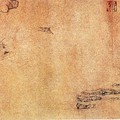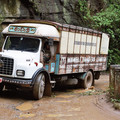Quotes - New Quotes
„There is also a lack of formal definition for "gu shu." Some say "gu shu" should only refer to trees over 300 years of age, that is left to grow tall, and not pruned back. But in reality, most "gu shu" trees are cultivated, which entails annual pruning to encourage regrowth & lower branches for easy picking. A lot of "gu shu" on the market comes from trees as young as 100 years old, some of which is as short as 1.5m high. But a 100 year old tea tree growing in the wild can also grow higher than 3m high. Eventually the government will legislate what classifies as "gu shu." Until then, let the buyer beware!“

Quotes Tags: Pu-erh, Gushu, Tea production
„The terms "Xiao shu" (small tree) and "tai di" (terrace plantation) are often interchangeably used, but they should be given separate meanings. "Tai di" connotes high intensity farming, with the entire slope cleared & terraced to plant hedgerows & use of pesticide & fertilizer. But in many gu shu growing villages, there are also new tea plantations which are too young to be called gu shu (ie. less than 100 years old), but they aren't exactly "tai di" either. Many of these plants are growing next to old trees, in a bio-diverse forest clearing, with lots of space around them, not all are sprayed & fertilized. In the future, they will grow into "gu shu", until then we should call them "shen tai xiao shu" (naturally grown small trees)“
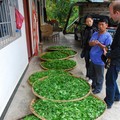
Quotes Tags: Pu-erh, Gushu, Tea production
„I had heard from other puer buyers that Ma Hei farmers now use pesticide & fertilizer to boost yields. But as we stood there critiquing this batch of Ma Hei tea, a large, multi coloured beetle crawled out of the leaf pile. “We call this guy the tea boss” Mr. Gao explained. “If he’s around, it’s a good sign!”“
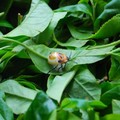
Quotes Tags: Pu-erh, Gushu, Tea production
„When examining maocha, the colour of gu shu leaves tend to be more highly contrasted with a bright white hairy bud/tip surrounded by a grey, open leaf wrapper, with dark black stem & leaves. By comparison, tai di cha is almost all black, due to the use of fertilizer, the leaves grow quickly and the buds have less white hairs.“

Quotes Tags: Pu-erh, Gushu, Tea production
„Mr. Gao showed us how to identify gu shu (ancient tree) tea leaves by looking at their texture, rubbing them between your fingers, and eating them raw. Old tea trees produce thicker, more leathery leaves that don’t easily come apart when you rub them. And gu shu buds should be white & shiny. When you chew them, the flavor is very bitter but there is also a strong sweet fragrance, and the juice is relatively easy to swallow. Tai di cha (terrace plantation tea) is also bitter but with a strong, lasting astringency on the sides & front of the tongue, and the juice is harder to swallow.“

Quotes Tags: Pu-erh, Gushu, Tea production, Experiencing tea
„Mr. Gao pointed out some caterpillars that were fattening themselves on tea leaves. “No pesticides used here.”“
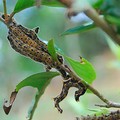
Quotes Tags: Pu-erh, Gushu, Tea production
„I found my early blogging efforts, basically writing down my impressions of the tea I drank every day, to be a worthwhile exercise – it helps me process what I’ve had and what I thought, and once in a while I go back to my own ideas back then and realize how I have developed as a drinker, as well as how a tea may have changed over time. Many of my earlier perceptions are flawed, if not outright wrong, or at least have been modified over time by my experiences since then. Writing about it constantly here helps me work through those thoughts.“
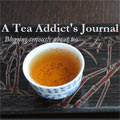
Quotes Tags: Experiencing tea, Pu-erh, Oolong
„Tea learning is, at the end of the day, a solitary experience. No one knows what you’re tasting, so no one but you can teach yourself.“

Quotes Tags: Experiencing tea, Pu-erh, Oolong
„The important thing of all this tea drinking and learning is not so much the drinking itself, but the critical reflection and evaluation that takes place simultaneously. Forget about what others tell you – what do you feel and think when you’re drinking this tea? How does it compare with what you have tried? How does it challenge what you already think you know?“

Quotes Tags: Experiencing tea, Pu-erh, Oolong
„Or perhaps you experiment with different parameters, water, ware, etc. and notice that it performs differently under different circumstances. This type of knowledge is not possible if you only have 25g of a tea. It can really only come with drinking 200, 300, or even 1000g of the same tea.“

Quotes Tags: Experiencing tea, Pu-erh, Oolong
Teas
2014 Spring Te Ji Grade Lianghe "Hui Long"
 1 review
1 reviewSelected grade famous high mountain green tea from Huilong Zhai, Dachang village, Lianghe county, Dehong...
2014 Yunnan "Bai Mu Dan" White Tea
 1 review
1 reviewFujain famous white tea "White peony" (Bai Mu Dan)- Taste similar but not the same. This tea come from tea...
Theme
Tea by region
We will help you with tea selection.
Do you like quality loose tea?
We will help you to find the right one for you. Be inspired by tea ratings of other tea lovers. Rating stars could help you.


Review your cup of tea.
Review the tea you are drinking and help other tea lovers to find the right cup of tea.



Quotes
„Yunnan Provincial Government has stipulated that for tea to qualify as Pu er it must be:
i) of the Broad Leaf variety (Sinensis Assamica)
ii) grown in the Lancang (Mekong) River region
iii) sun dried. The third point is important as there is much tea grown in the Lancang River area that is not sun dried.
There are also increasing amounts of Small Leaf Variety (Xiao Ye Zhong /小叶种) being grown in the Lancang River area.“



 Shops
Shops Share on Facebook
Share on Facebook






